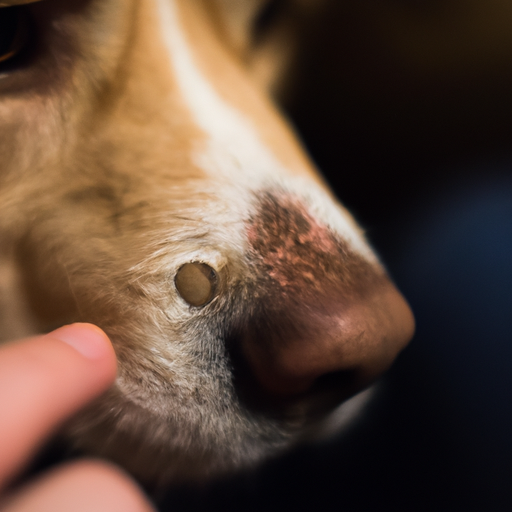As a pet parent, it’s natural to worry when you notice something unusual about your beloved canine companion. One such concern might be a cracked nose. Although it’s a common issue, it’s essential to understand what causes it and how to treat it effectively.
Table of Contents
- Understanding a Dog’s Nose
- Common Causes of a Cracked Nose
- Symptoms of a Cracked Nose
- Treatments for a Cracked Nose
- Preventive Measures
- FAQs
Key Takeaways
- A dog’s nose can crack due to various reasons, including dehydration, sunburn, allergies, and more.
- Symptoms of a cracked nose in dogs include dryness, discoloration, and visible cracks.
- Treatments for a cracked nose can range from home remedies to vet-prescribed medications.
- Prevention strategies include providing adequate hydration, using dog-safe sunscreens, and avoiding allergens.
Understanding a Dog’s Nose
A dog’s nose, also known as the rhinarium, is a particularly sensitive area. It is generally moist and cool to the touch, a condition facilitated by a thin layer of mucus that aids in scent detection. However, various factors can interfere with this condition, leading to dryness and cracking.
Common Causes of a Cracked Nose
There are several reasons why your dog’s nose may crack.
Dehydration: Dehydration can cause a dog’s nose to become dry and subsequently crack. Make sure your dog has constant access to fresh water, especially during hot weather.
Sunburn: Similar to human skin, a dog’s nose can get sunburned, leading to peeling and cracking. Dogs with light-colored noses are particularly susceptible.
Allergies: Dogs can be allergic to various substances, from food to environmental factors like pollen or cleaning products. These allergies can manifest as skin issues, including a cracked nose.
Autoimmune Disorders: Certain illnesses, such as lupus or pemphigus, can cause a dog’s nose to crack. If you suspect your dog’s nose issues are due to an underlying health condition, consult with a vet immediately.
Age: As dogs age, their skin can become drier, which includes the skin on their noses.
Symptoms of a Cracked Nose
The symptoms of a cracked nose in dogs can vary but usually include the following:
- Nose appears dry and rough
- Visible cracks or fissures
- Discoloration or change in texture
- Peeling skin
- Frequent rubbing or scratching of the nose
If you notice any of these symptoms, it is advisable to seek veterinary guidance.
Treatments for a Cracked Nose
The treatment for a cracked nose will depend on its cause.
For minor cases caused by dehydration or sunburn, home remedies may be sufficient. Applying a dog-safe moisturizer or balm can help soothe and heal a cracked nose. However, ensure that the product you choose is safe for dogs, as some human products can be harmful if ingested.
For more severe cases or if the cracking is due to an allergy or autoimmune disorder, a vet may prescribe medication or a special cream.
Preventive Measures
Prevention is always better than cure.
- Hydration: Ensure your dog has constant access to fresh water.
- Sun Protection: Use a dog-safe sunscreen, especially if your dog spends a lot of time outdoors.
- Allergen Avoidance: If your dog has known allergies, do your best to keep them away from allergens.
- Regular Check-ups: Regular vet check-ups can help detect any potential issues early on.
FAQs
1. Is a dry nose a sign of illness in dogs?
Not necessarily. While a persistently dry and cracked nose could indicate an underlying issue, a temporary dry nose is often nothing to worry about.
2. Can I use human lotion on my dog’s nose?
It’s best to use products specially formulated for dogs as some ingredients in human lotions can be harmful to dogs if ingested.
3. How often should I apply balm to my dog’s nose?
This depends on the severity of the cracking. It could range from once a day to several times a day. Always follow your vet’s advice.
In conclusion, a cracked nose in dogs is a common issue with various potential causes. By understanding these, you can take the necessary steps to prevent and treat this condition, ensuring your furry friend stays happy and healthy. For further reading, check out these articles on dog care and common dog illnesses. For more specific information on cracked noses, this article on dog skin conditions can be particularly helpful.
For additional resources, you might find this external article on dog nose health beneficial, and this external article on dog hydration is great for understanding the importance of keeping your dog well-hydrated.



